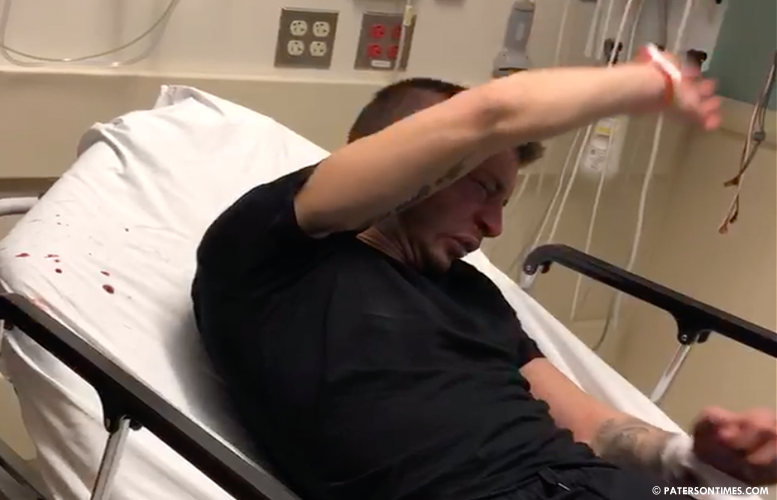
Andrew Casciano
It was only supposed to be a simple call. Police in Paterson, NJ, were assisting in a phone call for a suicide attempt, and had met the victim at the St. Joseph’s Medical Center in Paterson, a little over a year ago. Later, as video emerged from the two police officers’ own recorded video, the victim was beaten and slapped by those officers—Ruben McAusland and Roger Then. The first footage shows the victim—Andrew Casciano—being slapped by McAusland in the waiting room of the emergency room as he is wheeled in.
The second footage, shot by Then with a shiteating grin on his face before the assault took place, shows McAusland reacting violently to a suicidal patient’s comments, slapping the man hard enough—twice—for blood to splatter on the bedsheets.
I have members of my family that work in behavioral health units. Under no circumstances are they to even consider touching a mentally ill patient unless they pose a direct and violent threat to the nursing staff or to themselves. There is extensive training to spot those risks. Casciano was laying in a hospital bed. His only weapon? A box of latex gloves that he threw at an officer. McAusland abused his authority and punched a man who, for all intents and purposes, was attempting to goad the police into killing him.
But the violence that McAusland and Then inflicted on Casciano is only part of the charges that have been leveled against them and four other Paterson police officers, including assault, dealing drugs and an attempted coverup. McAusland pleaded guilty to “possession and distribution of heroin, cocaine and marijuana—all of which he said he stole from a crime scene while he was on duty—and to depriving Casciano of his civil rights by assaulting him in prison.” McAusland was sentenced to 5 ½ years in prison. Then, who blamed the assault on McAusland, was sentenced to six months after pleading guilty to concealing the civil rights violation.
The videos go a long way in illustrating the ways police officers abuse and violate the trust of the community in Paterson. They are also indicative of the ways in which the police and the entire criminal justice system are inherently abusive.
Mentally ill individuals have not often been highlighted in police brutality; they are always considered an afterthought. Is it because we don’t legitimately view mental illnesses as real illnesses that could have devastating effects on people’s interactions with police? People with untreated mental illnesses are 16 times more likely to be killed during a police encounter that other civilians approached or stopped by law enforcement.
According to a report by the Treatment Advocacy Center, though individuals with untreated mental illnesses number only 1 in 50 US adults, they are involved with at least 1 in 4, and as many as half of all fatal police shootings. According to the co-author of the study, executive director John Snook, “By dismantling the mental illness treatment system, we have turned mental health crisis from a medical issue into a police matter. This is patently unfair, illogical and is proving harmful both to the individual in desperate need of care and the officer who is forced to respond.”
I have had two very uncomfortable encounters with the police, both when I’ve been in the midst of panic attacks. The two officers ranged from casual indifference to outright belligerent rudeness. I did not feel safe in the company of those individuals. You can blame the lack of training the police officers have with mentally ill individuals; but it also highlights how policing is consistently and diametrically opposed to any kind of public safety or community safety, and that needs to end.
(Photo Credit: Paterson Times)